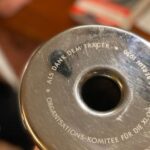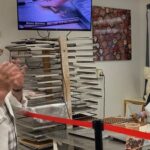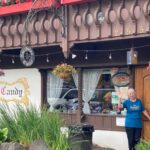Banel: Olympics-sized love for Boehm’s Candies in Issaquah
Jul 31, 2024, 2:10 PM | Updated: 3:46 pm
The 2024 Olympics are underway in Paris, and athletes from around the world are competing for medals in dozens of categories. But this isn’t the City of Light’s first rodeo, as they say, since the summer games were held in the French capital once before one hundred years ago in 1924.
With this centennial in mind and a nose for the local angle, KIRO Newsradio set out on the trail to Issaquah to track down a long-ago connection between those 1924 games and a longtime Northwest candy maker.
Boehm’s Candies has been part of the local landscape since the company was founded in Seattle in the early 1940s by Julius Boehm, a Swiss-Austrian refugee who had fled the Nazis in the run-up to World War II.
Boehm built the distinctive “Edelweiss Swiss” chalet in Issaquah in the 1950s, and the facility still operates as a factory and a retail store. The manufacturing space has been expanded a few times, and though now located on what’s become a side road, a tall Boehm’s sign is clearly visible from Interstate 90, right as the freeway starts climbing toward Snoqualmie Pass.
More Feliks: New book showcases ‘Signs of Vanishing Seattle’
Back in the 1950s, that side road was actually old US Highway 10 or what was called the Sunset Highway. Like I-90 today, it was the main east-west road across the northern part of the United States. For the chalet’s first few decades, it was something of a classic roadside tourist attraction, conveniently located just off the well-worn, cross-country pavement.
Like so many entrepreneurs operating during the post-war era when the business took off and Boehm’s reputation grew, Julius Boehm was something of a larger than life character. He was ambitious, driven, and generous to his employees and the community. He was also an accomplished alpine and aquatic sportsman, and lived his long life with what sounds like a sense of artistic and athletic gusto.
“Julius founded the ski school up on Hyak, and he was competitive in 14 different sports,” said Bernard Garbusjuk, a native of Germany who first went to work for Julius Boehm 53 years ago. “And he was a great photographer.”
Boehm first settled in New England in the 1930s but then came to the Northwest for the mountains. He brought a generous helping of his native Austria and adopted Swiss homeland with him – devoting decade of his life here to his work as a ski instructor, swimming teacher and, of course, a maker of chocolates.
Julius Boehm passed away in 1981 in his mid 80s. Bernard Garbusjuk took over as owner, and has been running the company ever since.
Bernard says that back in the day, Julius Boehm was well-known in Issaquah for his devotion to athleticism. Boehm climbed Mount Rainier at age 70 and again at age 80, and then did it one more time at age 81 (and he is still believed to be the second-oldest person ever to climb the peak). The public pool in Issaquah is named for him. And well into his twilight years, Bernard says, Julius Boehm would go shirtless, and was known for his, shall we say, “European” approach to coaching swimmers at nearby Lake Sammamish.
All Over The Map: Searching for ‘ghost signs of the air’
“Julius would go to work here [at the chalet], take his little car, probably drive – already in Speedos – from here to the beach, and then make basically like a public event for walking through the parking lot into giving his classes for the kids,” Garbusjuk said. “But if the kids swum their 15 minutes or 45 minutes … then they would get some extra chocolates for that.”
Mindi Reid is a longtime Boehm’s employee and serves as the unofficial company historian. She remembers meeting Julius at the chalet when she was a little kid.
Reid says that Julius Boehm competed for his native Austria at the Paris Olympics in 1924, serving as “anchor” in a four-man relay running race. The Austrian team came in fourth in the competition and so missed out on a medal – the Americans won the gold, Reid says – but the experience marked the beginning of a lifelong love of amateur athletics for Julius Boehm.
Both Bernard Garbusjuk and Mindi Reid say that competing in the Olympics in 1924 was a pinnacle of achievement for Julius Boehm, but was likely a very different experience for him compared to being an Olympic athlete today.
“There was a definite [distinction] between amateur sports” and paid athletes a century ago, Garbusjuk said.
“There was really a personal character and honor element to the whole idea of being an athlete, and sportsmanship, and your team, and not being a celebrity in the way we think of such things,” Reid said. “So it really was a very different mindset.”
The 1924 Olympics weren’t a footnote in Julius Boehm’s life story, and he appears to have relished being an Olympian. On the second floor of the Edelweiss Chalet, where Boehm’s personal office and residence were located, the recognizable six rings are carved into the front door, each ring roughly a foot high. Inside, Boehm’s Olympics memorabilia is displayed in a place of honor amongst works of art and other decorative elements.
Much of the second floor of the chalet remains untouched from Julius Boehm’s time. His custom entertainment center, replete with record player and reel-to-reel tape deck, is enclosed in a custom wood cabinet with matching speakers, with records and tapes arranged nearby. A television is hidden within a similar piece of ornate furniture. Two-dimensional art lines the walls, and sculpture takes up much of horizontal space on furniture and shelves. On other shelves, books and more records and tapes take up much of the usable space.
MyNorthwest History: Icon extinguished as big blue flame neon sign leaves Seattle
With all the personal artifacts, it almost feels as if Julius Boehm left the room only moments ago.
“I still have the old flashbulbs here,” Garbusjuk said, opening a dresser drawer and showing off the mixture of mundane and collectible contents. “And films from the 1930s and whatever … I don’t know what to do with it.”
Garbusjuk said the upper floor of the chalet is not a shrine to Julius Boehm, but then struggles to define what the space is. Mindi Reid offers another descriptive term.
“It’s a house museum,” Reid explained, and is featured in the regular factory tours the Boehm’s offers by reservation. “It’s the immigrant experience encapsulated.”
Whatever the space is called, one of the coolest artifacts on display there is from another part of Julius Boehm’s personal Olympics history.
It was a dozen years after competing in Paris when Boehm was invited to carry the Olympic torch part of the way from Athens to Berlin for the infamous 1936 Olympics. Bernard Garbusjuk believes Boehm’s part of the route included the roadway from Austria across the border to Czechoslovakia.
Boehm was allowed to keep the torch he carried on his leg of that ceremonial run 88 years ago, and it forms the centerpiece of the Olympics display on the second floor.
Still, beyond just a “house museum,” Julius Boehm’s old space in the chalet feels more like a repository of the history and values of what’s still a fiercely local business, still going strong under local ownership more than 40 years after its founder passed away. And that seems like a rare thing these days.
“Everything has a story in here,” said Mindi Reid. “You feel sometimes overwhelmed by all the history that’s here because of all the lives and all the talent and Julius’s very strong personality kind of bringing it all together, and then Bernard carrying it on.”
Boehm’s simply wouldn’t be Boehm’s anymore, says Mindi Reid, were it not for Bernard Garbusjuk.
“Without Bernard,” Reid said, “half the story would not exist.”
It’s clear Bernard Garbusjuk has a lot of love and respect for Julius Boehm, and that he’s poured his own heart and soul into the business, too.
As the owner who took over from the founder, Garbusjuk has witnessed innumerable changes in the business world in the past few decades. In 2024, more than 80 year after it was founded, Boehm’s appears to be a healthy – and very old-school – business, that’s also a labor of love.
“The good news is we are owned not [by some other] corporation,” Garbusjuk said. “We are a corporation, but basically it’s my son, my daughter, and long-established employees who are running the logistics of Boehm’s Candies.”
“We would be really in trouble if we were driven only by making money,” Garbusjuk added.
Julius Boehm and Bernard Garbusjuk are reminiscent of other figures in the Puget Sound area whose private retail businesses have become part of the culture, just as much as the music, novels, movies and TV shows associated with the region. They belong on a list that would also include beef jerky magnate Art Oberto, Harry Yoshimura of Mutual Fish and even George Bartell of Bartell Drugs – as well as candy companies like Brown & Haley and Aplets & Cotlets.
The strong relationship between the owners, operators and staff of the local businesses that survive, and the loyal customers who keep coming back out of sense of tradition and wanting to support what can only be called local institutions, is a phenomenon worth noting and praising. It’s worth celebrating as a kind of relay team, passing the baton and outrunning history, all in the spirit of local culture and economics.
And for that, Boehm’s and their customers deserve a gold medal.
You can hear Feliks Banel every Wednesday and Friday morning on Seattle’s Morning News with Dave Ross and Colleen O’Brien. Read more from Feliks here and subscribe to The Resident Historian Podcast here. If you have a story idea or a question about Northwest history, please email Feliks. You can also follow Feliks on X.


















